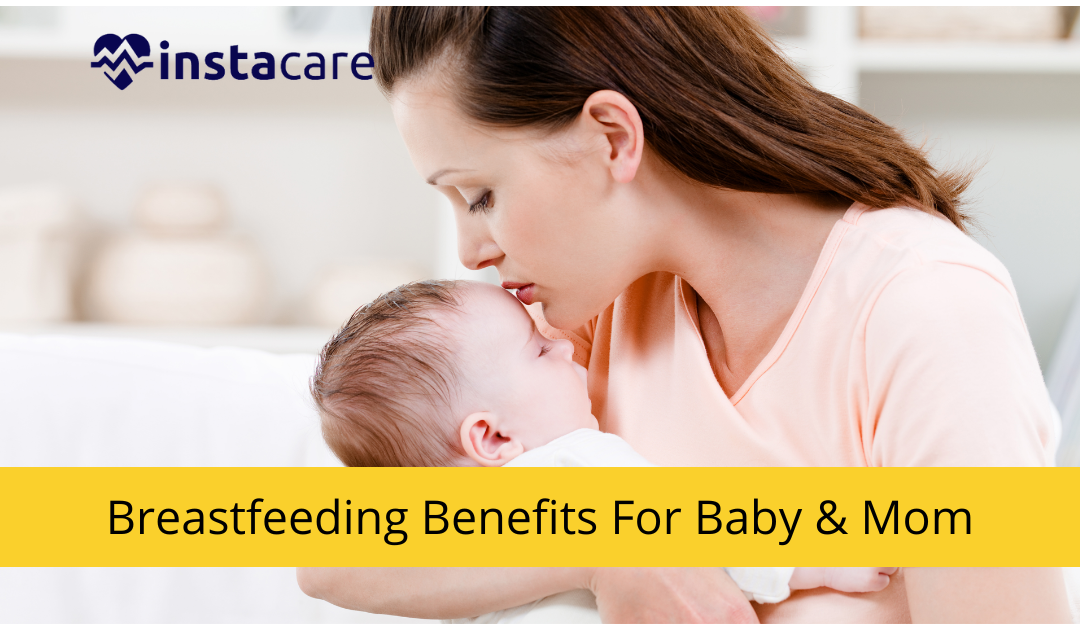Breastfeeding, often called nursing, provides a child with human breast milk. Breast milk can be expressed from the breast or pumped and supplied to the newborn.
Three Stages Of Breast Milk
It may surprise you to learn that your breast milk changes by the week at first, and each formulation is meant to match your newborn's specific needs:
Colostrum
Initially, you produce a yellow fluid known as colostrums. Colostrum helps your baby get the nutrition and antibodies he needs to battle illnesses in the beginning. Because a little goes a long way, your kid may require a few tablespoons at a time, which may be all you're generating.
Milk in transition
Transitional milk replaces colostrums three to five days after delivery. Transitional milk, which looks like a combination of orange juice and milk, is the stage between colostrums and mature breast milk, and it's just what your kid needs right now.
Matured Milk
Mature milk is typically delivered between the tenth and second week of the month. It's white and somewhat thinner than transitional milk, with the appearance of watery skim milk at first.
View More: Headache During Pregnancy
How To Breastfeed A Baby?
Most newborns require a bit more work to acquire a good latch. Latching on becomes second nature once you and your child master it. These pointers may be helpful:
- Make yourself at home: Select a chair or glider with back, neck, and shoulder support.
- Set it up: Your infant should always be stomach to tummy with you. You may need to use cushions to raise your infant to breast height.
- Bring your baby into position: Wrap your nipple over his lips, back and forth, and wait for a giant yawn. Instead of leaning in toward your baby, bring him toward the breast. This will prevent back and neck problems. The point of his nose and his chin should be on the breast.
- Suckling and sucking are not the same: A suck-swallow-breathe rhythm indicates that your baby is latched on and suckling (extracting milk from the breast).
- Seek assistance: Contact a lactation consultant if you're having problems getting your baby to latch on. They can evaluate your baby's latch and give recommendations, such as briefly using a breast shield.
- Remove the seal: Try again if you don't obtain a good latch the first time. Pull your breast out by inserting your finger into the corner of your baby's mouth. Continue the cycle until you have a seal that covers both the nipple and the areola.
Benefits Of Breast Feeding For Baby
Breast milk has several health and developmental benefits for your kid. It's ideal for providing your kid with nutrients, cells, hormones, and disease-fighting antibodies to keep them healthy.
Growth Of The Jaws
Breastfeeding increases jaw development because your infant has to work harder to receive milk from your breast than from a bottle. Breastfeeding strengthens your baby's jaw and promotes the formation of straight, healthy teeth.
Keeping Illnesses At Bay
Over time, your body will adjust to the milk you make. It is thought that your baby's saliva sends a "status report" to your body, which allows it to adjust the vitamin and antibody content of your milk to match your baby's changing demands. Your body creates antibodies to combat the diseases in your surroundings; therefore, your milk is tailor-made to combat the diseases your infant is exposed to.
View More: How To Deal With Postpartum Depression
Development Of The Digestive Tract
Because they are manufactured from cow's milk, formulas can be difficult for your child's growing digestive tract. Your baby's tummy will need time to acclimate to digesting non-human milk. This is particularly true for preterm infants. Furthermore, because breast milk is derived directly from the breast, it is always sterile—this aids in preventing digestive disorders such as diarrhea.
Benefits Of Breast Feeding For Mothers
Breastfeeding is also beneficial to new mothers. To begin, nursing allows you to immediately fulfill your baby's appetite without having to bother about bottles, sterilizing bottle nipples, or preparing formula. It can also reduce your chance of getting type 2 diabetes, some forms of breast cancer, and ovarian cancer. Breastfeeding can also help your uterus return to its pre-pregnancy state faster.
Conclusion
Remembering that breastfeeding is a personal decision, and how you parent your child is ultimately up to you. Also, remember that nursing is a skill that must be taught – a journey that you and your baby will begin together as you welcome the newest member of your family.
Please book an appointment with the Best Gynecologist in Lahore, Karachi, Islamabad, and all major cities of Pakistan through InstaCare, or call our helpline at 03100002273 to find the verified doctor for your disease.
Source: https://instacare.pk/blog/how-breast-feeding-is-beneficial-for-both-mother-and-baby












